The Story Behind a Local Librarian’s Highly Anticipated Documentary
Published on April 09, 2024
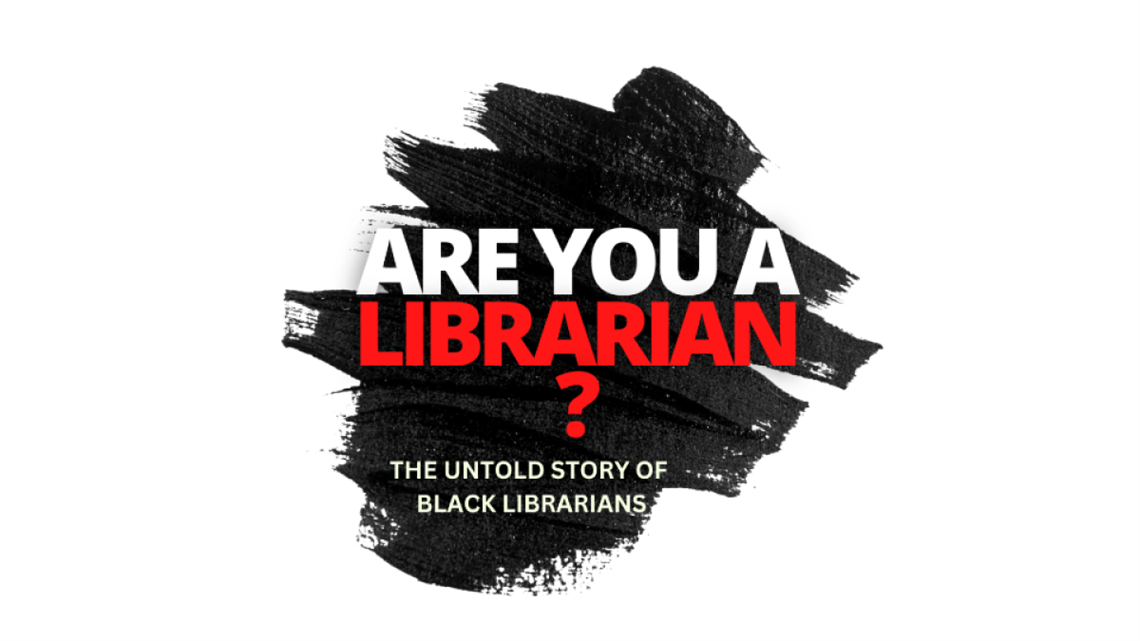
By Kayla Chadwick-Schultz
“Are you a librarian?” It’s a seemingly innocent question, probably asked by someone who just wants to know more about your profession, right? Well, not for the University of North Carolina at Charlotte’s Digital Production Librarian and Archivist Rodney Freeman. In his experience, that question is not one of innocent curiosity; it’s a microaggression built on the assumption that Black people cannot be librarians.
This assumption is not true, of course. There are many Black librarians across the country. However, the history of Black librarians and their fight for the right to literacy and access to information for all Black Americans has never really been told before. Their stories have not been shared. Freeman realized this during the American Library Association (ALA) Annual Conference, when he was talking with a group of Black male librarians who had all expressed similar experiences within the profession. He asked himself, “Who’s going to document their story?”
That singular moment of wonder gave birth to a passion project that Freeman would spend the next couple of years pursuing—a documentary entitled Are You a Librarian: The Untold Story of Black Librarians.
First Step: Getting the Word Out
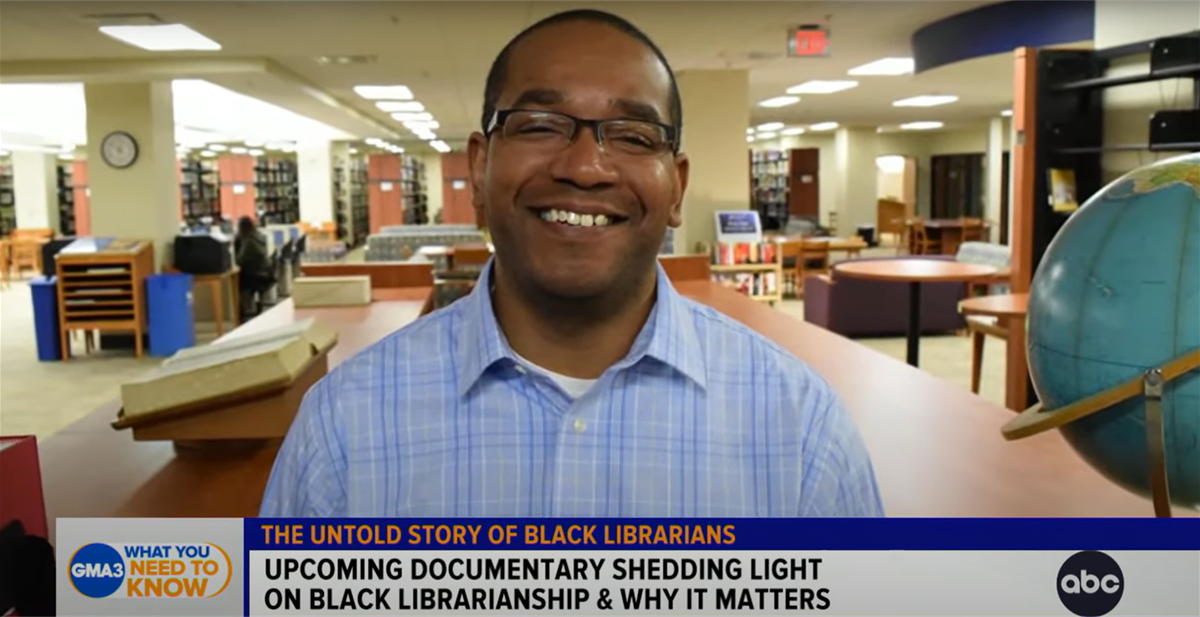
Freeman on Good Morning America to promote the documentary (via YouTube).
I first met Freeman during my time in UNC Charlotte’ Public History program. I spent a lot of time Atkins Library, particularly in the Dalton Reading Room on the 10th floor. This is where you’re allowed to view the library’s Special Collections & University Archives. It’s also where I ended up seeing Freeman again while conducting research for my article on Martin Luther King, Jr.’s historic presence in Charlotte.
He was the librarian/archivist on staff in the Dalton Reading Room that day, and he had recognized me from our previous encounters. As we were catching up, he mentioned having recently been featured on Good Morning America for his new project about the history of Black librarianship. That certainly caught my attention. It’s not every day you hear about local librarians making it onto national news programs. Naturally, I wanted to learn more, but I also had a lot of research to do. So, we decided that I would come back later to talk to him and his colleague, Community Engagement Librarian/Archivist Adreonna Bennett, who has also been working on the documentary.
And, well, that’s exactly what I did. Of course, I went home and watched the Good Morning America interview first to learn more about the project. In addition to highlighting Freeman and many of the voices that contribute to the documentary, it also shares some enlightening historic facts and statistics—including that African Americans only make up 7% librarians in America as of 2021. The interview portion of the video closes with a quote from Freeman: “The library is open for everyone., and that is truly what it means to be a Black librarian. We want to represent everyone.”
As the video ended, I immediately wanted to know more—not about the documentary itself, though I cannot wait to watch it when it premieres in 2025, but more about him. I wanted to know more about his impetus for creating this documentary in the first place. I wanted to know his why.
Now, I’ve already shared the moment when he came up with the initial idea at the ALA Annual Conference, but how he got there is a story all its own.
The Librarianship Journey of Rodney Freeman
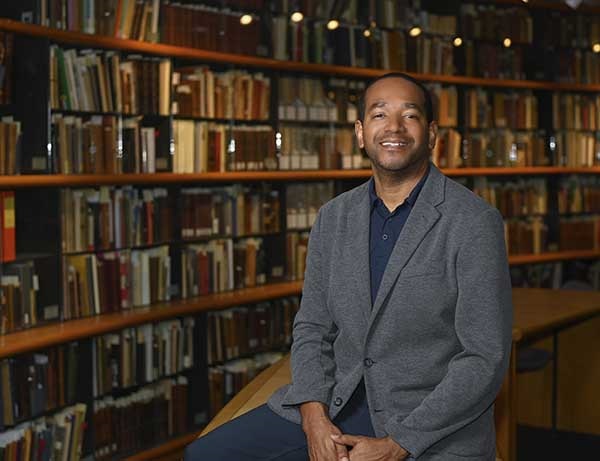
Rodney Freeman posing in the Dalton Reading Room at UNC Charlotte (via UNCC).
“I did not want to go into librarianship,” Freeman revealed when I asked about how he got where he is today. “Like, it was my last choice. It wasn’t even a thought, really.” Freeman had recently finished his master’s in public administration and moved back home to Kankakee, Illinois. He had his sights set on law school, but he knew that he had to make some money in the meantime. He juggled studying for the LSAT (Law School Admission Test) with “applying for jobs left and right,” as he put it. It wasn’t until one fateful day, when he went to study at the Kankakee Public Library, that everything fell into place.
“I had seen the sign up on one of these tabletops, and it said they needed Pages. And I was just like, okay well I’ll apply for a Page,” Freeman explained.
After submitting his application, Freeman was asked to come in for an interview. He recalled what happened next with fondness, “They were sitting down and were looking through my resume, and they looked up and were like, ‘Well, it seems like you might be a little bit overqualified for this job.’” He laughed, recalling the frustration of finally getting an interview only be told he was too qualified. However, just as he was about to brush it off and move on, one of the women interviewing him stopped him and said, “But I think you might be good for the library.”
That was it. He was hired by the Kankakee Public Library and started working in the children’s department. Surely, he had no idea where the decision to take that job would eventually lead him. That younger version of himself would have probably laughed at the idea of being featured on Good Morning America as a noted librarian and archivist. He still thought he was going to law school.
“My director at the time, she sat me down, and she was like, ‘I see you working with the kids every day. You’re always on time. You always do what anybody asks. Why don’t you think about being a librarian?’” His immediate thought was, “Yeah right, I’m not going to be a librarian,” but his director spelled it out for him. He already had a degree in public administration, so if he combined that with an MLS (master’s in library science) then he could become a library director one day. That caught his attention.
After doing some research and admitting to himself that he did, in fact, enjoy working at the library, he decided to pursue an MLS at Indiana University-Purdue University Indianapolis (IUPUI), which had a program geared toward adding more diverse candidates to the library profession. The next chapter of his librarianship journey saw him succeeding in school and bouncing all over the east coast from one great job opportunity to the next. He was a Regional Branch Manager here and there. He was the Library Director of Chicago’s Woodson Regional Library, home to the Vivian G. Harsh Research Collection—one of the biggest collections of African American history and literature in the Midwest. He spent some time in Tennessee and at NC State University. Then, he eventually found himself down in Florida, where he was once again a Library Director but under much different circumstances.
“It was an intense project,” he recalled. “We had to move the library building, which was dilapidated and condemned. It was during COVID, so people couldn’t go in anyway, but they still had the library workers working in there. Go figure. But they wanted to move that library building to a co-location space. So, we were at a 14,000-square-foot footprint going down to a 10,000 one. And then my Assistant Director quit.” He spent the next year navigating the difficulties of maintaining a library in various satellite locations while preparing for a massive move with little staff. It proved to be too much for him.
“At the end of that, I was just like ‘I’m done. I’m done with the library profession. I’m going to start my own business, because if I can work this hard for somebody else then I can work this hard for myself.’”
Of course, Freeman wasn’t done with the library profession right then and there, but he did pause to focus all his attention on Reminisce Preservation—an information services company he founded in 2018 that provides resources on marginalized histories to libraries, schools, nonprofits, and individuals. The company began as a way to collect these histories in online databases and has since grown to include mapping projects and Freeman’s Are You a Librarian documentary.
His personal life ultimately brought him Charlotte, where he applied for his current position at UNCC. He no longer had the desire to be a full-time Library Director, but the idea of digitizing and cataloging materials while also continuing his work with his company was very enticing. He was able to balance life, work, and passion projects in a way that wouldn’t have been possible in his previous positions, but he was (and still is) very much a librarian.
The Desire to Make a Documentary
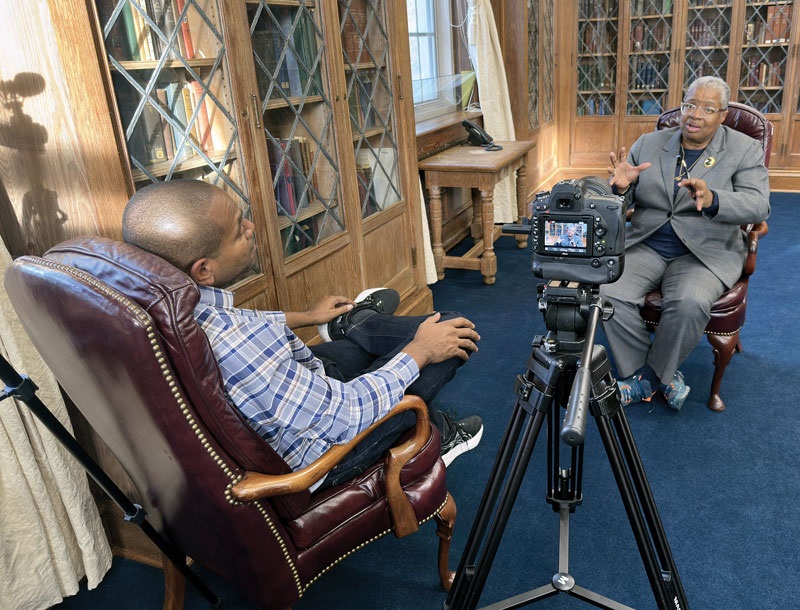
Freeman interviewing Del Hornbuckle, Director of Libraries at Howard University (via School Library Journal).
Now, you might be wondering why I told you all of that. What does Freeman’s resume have to do with this documentary? The answer to that is, well, everything.
First, it provides a definitive answer to the central question. Is Rodney Freeman a librarian? Yes.
Second, it is important to know who is behind a documentary—especially one that focuses on the lives of those marginalized within their profession. The person making the documentary will inevitably imbue it with their own lived experiences, so knowing them is essential to understanding the lens through which the story is being told.
That is why I wanted to share Freeman’s history of librarianship, because he is not just the filmmaker; he is the subject.
His first library job in Kankakee was one that championed diversity. From members of the community who frequented the shelves to the staff hard at work in the building, the Kankakee Public Library featured people from every walk of life. A diverse library is what Freeman knew, and he assumed that’s how it would always be.
It wasn’t.
“I saw that once I started elevating into management, it was more like, ‘Why are you here? Who put you here? You don’t belong here. I don’t know if you can really do this job,’” Freeman explained. Despite all of his qualifications, all anyone could see was the color of his skin. That was enough to make them doubt whether or not he deserved to be where he was. “I always wanted to just be able to do the work. You know? Instead of having all this other stuff around, whether it’s microaggressions, racism, whatever you want to call it.”
While he would eventually come up with the concrete idea for the documentary following his trip to the ALA Annual Conference, his work as a librarian is really where the idea began. Every time someone asked him that single question, another piece of it formed. Then, one day while working on some of the Reminisce Preservation databases he had built, he discovered something.
“I started taking a survey of how many vendors are African American that supplied information to libraries and museums, and I could only find three,” he recalled. His business would go on to be the fourth, and while he was happy to fill that space, he also wondered why it was so small. So, he took those concerns with him to the ALA Annual Conference.
“I was there showing people the database, and then I got connected with some Black male librarians. They were talking about their experiences and, you know, having a good time. And we all took a picture together.”
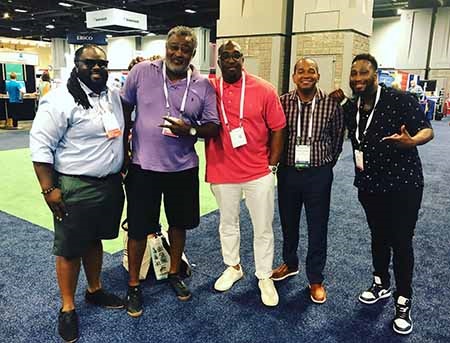
The picture Freeman (second from right) took at the ALA Annual Conference.
It was in that moment, standing with a small group of Black men, that Freeman had his realization that someone needed to tell their story. “When we go to ALA and some of these other conferences, there’s not that many of us there,” he explained. “And I’m like, ‘Who is really going to tell that story, and I hope whoever tells that story actually looks like us.’ Because that’s a big thing, making sure that narrative comes from the people that the story is being told about.” Of course, the person behind the narrative turned out to be him.
When he returned to Charlotte, he started sharing the idea for a documentary with other Black librarians and library professionals, and everyone told him it was a great idea. Unfortunately, everyone who loved the idea was also too busy to help him pursue it. So, he turned to his local team at UNCC—including Adreonna Bennett.
Similar to Freeman, Bennett kind of stumbled into librarianship. It wasn’t what she set out to do when she initially attended college, but before she knew it, she was at North Carolina Central University obtaining her MLS. She had fallen in love with the work, and she knew she wanted to help engage public audiences with all that the library had to offer.
Her role in community engagement, as well as her position as a Black librarian herself, made her a perfect candidate to join Freeman’s documentary team. When he approached her about the idea, she was quick to jump on board and ask what needed to be done to make it a reality.
They spent some time brainstorming what the documentary would look like, who should be featured in it, what all needed to be done, etc. Then, they got the ball rolling. “We did, like, 36 pre-interviews, and we had five questions,” said Freeman. “[Bennett] came up with all the questions.”
Though Bennett downplayed her involvement while we chatted with them, Freeman considers her and everyone else involved with the documentary as essential pieces to the overall puzzle. He is certain that he could not have accomplished all that he has alone, and there is still so much work yet to be done.
Learn More & Get Involved with Are You a Librarian
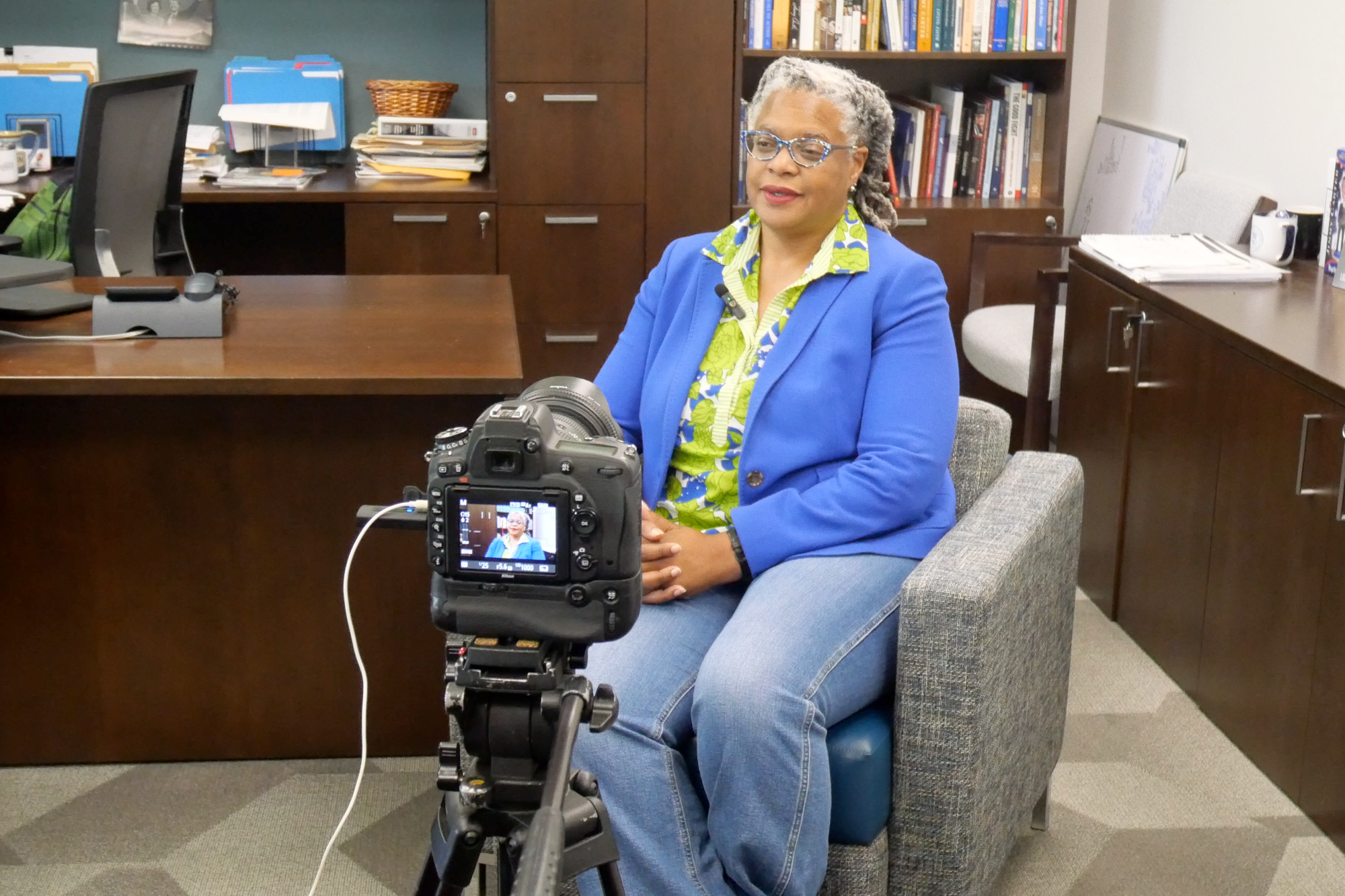
A behind-the-scenes look at filming the documentary (via Reminisce Preservation).
Freeman’s documentary is set to premiere at the 2025 ALA Annual Conference in Philadelphia, but it’s not quite finished yet. The team (which includes Freeman, Bennett, Zuri Davenport, Asia Harris, Angel Truesdale, and Byron Williams) is still actively crowdfunding through their GoFundMe campaign.
If you’re curious about the documentary and want to learn more about what all it covers, head over to the Are You a Librarian page on Reminisce Preservation’s website. There you will be able to read more about the film’s mission, watch a promotional video, and view behind-the-scenes photos. You can also tune in to the Are You a Librarian Podcast on YouTube or wherever you get your podcasts.
Bottom line, there are plenty of opportunities to get involved with this upcoming documentary, and we sincerely hope you take the time to engage with this untold history as it becomes available to you.
While we chose to tell the story of Rodney Freeman and his upcoming documentary this National Library Workers Day, that doesn’t mean that it’s the only example of Charlotte-based librarians doing incredible work. There are plenty of talented individuals across the Charlotte-Mecklenburg Library system and throughout the many institutions that make up our city. We ask that you recognize their contributions to the community today, tomorrow, and every day after by sharing your favorite librarian memories with us. Email crownculture@charlottenc.gov with your stories for a chance to be featured on our social channels or in our City Speaks newsletter.